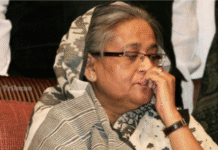
Wal-Mart Stores Inc. (WMT) and J.C. Penney Co. were among retailers sending representatives to a meeting near Frankfurt to discuss allying to improve worker safety in Bangladesh following the nation’s biggest industrial disaster.
The talks, organized by Germany’s international cooperation service known as GIZ, were aimed at winning support from the companies, labor unions and non-governmental groups for Bangladesh’s national action plan and for supplier assessments of fire and building risk, said Peter McAllister, a director of the Ethical Trading Initiative, who attended. A document covering the talks will be published May 15, he said.
The discussions were also aimed at winning backing for remediation programs to make existing buildings safe, McAllister said. The European Union, the country’s largest trading partner, has said it may apply sanctions in the wake of the disaster.
“There will be a strong call for as many brands as we can, who source in Bangladesh, to get behind” the document calling for higher safety standards, McAllister said.
Rescue efforts continued today at a factory complex in Savar, Bangladesh. The buildings collapsed on April 24, killing at least 433 people.
The disaster was at least the third reported industrial accident in the South Asian nation since November, when 112 people died in a fire at a workshop that was producing clothes for companies including Wal-Mart (WMT). The Bentonville, Arkansas- based retailer wasn’t involved in production at the affected factories in Savar, 24 kilometers (15 miles) northwest of Dhaka.
‘Comprehensive Approach’
“We are continuing to work with the industry association, suppliers, brands and other interested parties to come to an appropriate resolution,” Kevin Gardner, a spokesman for Wal- Mart, said in an e-mailed response to questions.
J.C. Penney will “take an active part in the dialogue that aims to come up with a comprehensive approach — that includes multiple stakeholders — to solving the factory safety issues in Bangladesh,” Daphne Avila, a spokeswoman for J.C. Penney, said in an e-mail.
The April 29 meeting was set up by GIZ, a branch of Germany’s Federal Ministry for Economic Cooperation and Development and the Federal Ministry of Finance, according to the organization’s website.
Hopes Fade
“It is very unlikely that we will find any more survivors,” Mir Rabbi, a duty officer at the control room supervising the salvage effort, said yesterday. While rescuers have pulled 2,437 people alive from the rubble, at least 149 people are still missing, Rabbi said.
Bangladesh’s High Court on April 30 ordered officials to seize assets belonging to Sohel Rana, owner of the eight-story Rana Plaza and member of the ruling Awami League political party’s youth wing, as well as those of four owners of garment factories in the complex.
The EU said it’s considering action under its trade rules to encourage changes in the nation’s supply-chain operations.
“The sheer scale of this disaster and the alleged criminality around the building’s construction is finally becoming clear to the world,” EU Trade Commissioner Karel De Gucht and Catherine Ashton, high representative for foreign affairs, said in a joint statement April 30. To encourage responsible management of supply chains, the EU is considering action through its Generalized System of Preferences program, which gives Bangladesh duty- and quota-free access to its market, he said.
‘Slave Labor’
Pope Francis yesterday condemned the working conditions of the garment workers of Bangladesh, calling it “slave labor,” during an audience in St. Peter’s Square on May Day.
Building owner Rana, 38, was flown to Dhaka after being arrested in the western border town of Benapole. Rana had planned to flee into India, Jahangir Kabir Nanak, state minister for local government, told cheering relatives of victims at the disaster site April 28. Police have arrested executives of four apparel makers housed in the building.
After cracks were found in the building on April 23, Rana forced workers to return to their posts and said it was safe as it was being checked by engineers, according to Mokhlesur Rahman, director general of the Rapid Action Battalion, an elite law-enforcement agency.
Rana Held
Rana’s wife and father were among the people arrested in connection with the collapsed building. The police have 15 days to interrogate Rana, according to a court order issued April 29. Anisur Rahman, chairman of Ether Tex, one of the five companies housed in Rana Plaza, turned himself in on April 28.
Rana’s permit to construct the building, where clothes were made for brands owned by Loblaw Cos. (L) and Associated British Foods Plc (ABF), was from the Savar Municipal Corp., a local body that has lower building standards, and not Dhaka’s development authority, said Sheikh Mannan, a planning member of Rajdhani Unnayan Kartripakkha, Dhaka’s development authority.
About half of Bangladesh’s garment factories don’t meet legal work-safety standards, said Kalpona Akter, executive director of the Bangladesh Center for Worker Solidarity, a non- governmental organization. A factory collapse in 2005 killed 64 and injured 80 people, according to the Clean Clothes Campaign, which seeks to improve working conditions in the garment and sportswear industries.
Collapse Risk
Bangladesh’s labor law requires safety measures including fire extinguishers and easily accessible exits at factories. The government has decided to form a panel to identify garment factories in the country at risk of collapse, Cabinet Secretary Musharraf Hossain Bhuiyan told reporters on April 29.
Loblaw (L)’s Joe Fresh clothing label and the Primark division of London-based Associated British Foods (ABF) have vowed to help improve working conditions in Bangladesh. Both retailers also said on April 29 they would pay an unspecified amount of compensation to the families of victims.
Matalan Ltd., a U.K. budget retailer, said April 30 that it wasn’t using suppliers based in the building, though it’s working with the Bangladeshi industry association to offer financial and other support to people affected by the collapse.
Surging wages and inflation in China, the largest apparel supplier, have prompted retailers including Wal-Mart, Hoffman Estates and Illinois-based Sears Holdings Corp. (SHLD) to shift production to Bangladesh.
The shift has given rise to an $18 billion garment industry, according to Export Promotion Bureau estimates. The business has been marred by plants operated in buildings with poor electrical wiring, an insufficient number of exits and little firefighting equipment.
Textiles contribute more than 10 percent of Bangladesh’s gross domestic product and about 80 percent of the nation’s exports, mainly to the U.S. and the European Union, according to the manufacturers’ association.
Source: bloomberg









